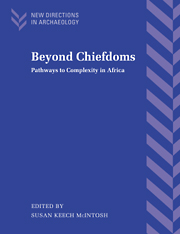Book contents
- Frontmatter
- Contents
- List of figures
- List of tables
- List of contributors
- Preface
- 1 Pathways to complexity: an African perspective
- 2 The segmentary state and the ritual phase in political economy
- 3 Perceiving variability in time and space: the evolutionary mapping of African societies
- 4 Western representations of urbanism and invisible African towns
- 5 Modeling political organization in large-scale settlement clusters: a case study from the Inland Niger Delta
- 6 Sacred centers and urbanization in West Central Africa
- 7 Permutations in patrimonialism and populism: The Aghem chiefdoms of Western Cameroon
- 8 Wonderful society: the Burgess Shale creatures, Mandara polities, and the nature of prehistory
- 9 Material culture and the dialectics of identity in the Kalahari: AD 700–1700
- 10 Seeking and keeping power in Bunyoro-Kitara, Uganda
- 11 The (in)visible roots of Bunyoro-Kitara and Buganda in the Lakes region: AD 800–1300
- 12 The power of symbols and the symbols of power through time: probing the Luba past
- 13 Pathways of political development in equatorial Africa and neo-evolutionary theory
- Index
7 - Permutations in patrimonialism and populism: The Aghem chiefdoms of Western Cameroon
Published online by Cambridge University Press: 14 October 2009
- Frontmatter
- Contents
- List of figures
- List of tables
- List of contributors
- Preface
- 1 Pathways to complexity: an African perspective
- 2 The segmentary state and the ritual phase in political economy
- 3 Perceiving variability in time and space: the evolutionary mapping of African societies
- 4 Western representations of urbanism and invisible African towns
- 5 Modeling political organization in large-scale settlement clusters: a case study from the Inland Niger Delta
- 6 Sacred centers and urbanization in West Central Africa
- 7 Permutations in patrimonialism and populism: The Aghem chiefdoms of Western Cameroon
- 8 Wonderful society: the Burgess Shale creatures, Mandara polities, and the nature of prehistory
- 9 Material culture and the dialectics of identity in the Kalahari: AD 700–1700
- 10 Seeking and keeping power in Bunyoro-Kitara, Uganda
- 11 The (in)visible roots of Bunyoro-Kitara and Buganda in the Lakes region: AD 800–1300
- 12 The power of symbols and the symbols of power through time: probing the Luba past
- 13 Pathways of political development in equatorial Africa and neo-evolutionary theory
- Index
Summary
There is an evolutionary bias in the anthropological view of political development, a bias that makes it seem obvious that political forms should have moved from the simple to the complex. Thus, “chiefdoms” necessarily arose out of acephalous structures such as “bands,” usually in response to similar economic conjunctures, such as a rise in trade. And the chiefdom, unless mired in evolutionary stagnation, necessarily moved in the direction of the “state.” This view of political complexification is perhaps not unrealistic in the very long term, but it becomes misleading when we extend it to the formation of actual middle-range polities in a particular ethnographic area. If the grand evolutionary scheme had indeed been working itself out uniformly over the centuries, there should have been very few small-scale polities in the world by, say, the nineteenth century, and they should all have been of very ancient vintage. Yet, when we look, for example, at Africa in recent times, we find it full of small scale polities whose formation usually dates back but a few centuries and often less.
I have argued elsewhere (Kopytoff 1987) that most of the African polities we know did not evolve out of simpler forms. To the contrary, they sprang out of more complex polities, having grown out of settlements of immigrants from chiefdoms and kingdoms, immigrants who had moved into the “internal frontiers” that lay at the fringes of fully formed polities. To these settlers, the frontier represented an institutional vacuum – an area that was out of the reach of established polities, or was entirely empty, or was under the uncertain sway of weak local hegemonies.
- Type
- Chapter
- Information
- Beyond ChiefdomsPathways to Complexity in Africa, pp. 88 - 96Publisher: Cambridge University PressPrint publication year: 1999
- 7
- Cited by



